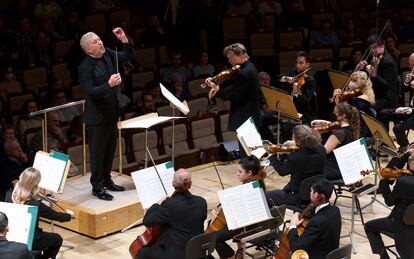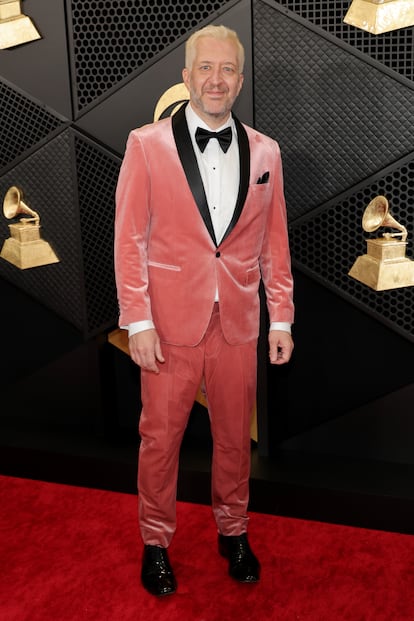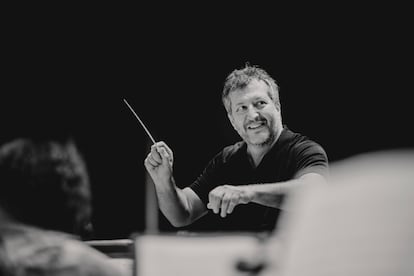Thomas Adès conducts Ravel: “He dared to put his technical exquisiteness at the service of an almost childlike emotion.”

For some time now, Thomas Adès has been dividing his calendar between a central London apartment, where he was born 54 years ago, and a modest but elegant house in the Hollywood Hills. “In Los Angeles, I enjoy nature without giving up the comforts of a big city,” the British composer and conductor explains over the phone from his studio. “For six months a year, I live surrounded by coyotes, crows, raccoons, and even rattlesnakes.” In this “dreamlike and almost unreal” setting, not far from the Mabery Road garden where Arnold Schoenberg played ping-pong with Johnny Weissmuller, the contrasts with old Europe have found new forms of expression. “Suddenly, a neighbor shows you a hiding place, full of weapons and explosives, that looks like something out of a David Lynch film,” he admits. “That dark side of Hollywood never ceases to amaze me.”
The awe that Spain inspires in him is equally intense, he asserts, although of a different nature. “The first foreign city I visited, when I was 12, was Bilbao, and since then, Spanish culture has been very present in my life,” confesses Adès, on the eve of his trip to San Sebastián to conduct the Paris National Opera Orchestra and pianist Kirill Gerstein this Wednesday in the final leg of the 86th edition of the Musical Fortnight. The first part of the concert will be dedicated to the 150th anniversary of Ravel's birth. “No other composer has dared to put the technical exquisiteness of his scores at the service of an almost childlike emotion,” he comments regarding Le Tombeau de Couperin , the Left Hand Concerto , and La Valse . “When I listen to these pieces, I feel like a child who has just witnessed a fascinating magic trick.”

The program will continue with the Piano Concerto that Adès composed to reflect the “immense talent and boundless versatility” of his friend Gerstein, who premiered it in 2019 at the request of the Boston Symphony Orchestra. Since then, he has performed it fifty times in venues around the world. “The score fits Kirill’s personality like a glove, combining the freshness of jazz with moments of intimacy or the most radical virtuosity, as we have seen him do with Brahms. He doesn’t just memorize the works, but studies them in depth to extract everything that goes beyond the notes.” Adès also trained as a pianist, but long ago eliminated recitals from his schedule. “Playing my own music makes me anxious,” he confesses. “Only when I am alone do I dare to lay my hands on the great works of Beethoven, Stravinsky, and Bartók.”

Conducting, he says, is a different story. “On the podium, I feel I have a goal to fulfill, if only to gently convince the musicians that what I've written isn't as difficult to approach as it might seem at first glance,” he jokes. “After all, it's my own voice that's sounding out…” This won't be the first time he's shaped the unmistakable sound of the Opéra Bastille's resident orchestra with his baton. With them, he officiated the Parisian premiere of his opera The Exterminating Angel last February, following the success, the previous season on the stage of the neighboring Palais Garnier, of Dante's , a ballet inspired by The Divine Comedy . “They were extremely enriching experiences, as pit work forces you to keep all five senses alert,” he recalls. “In opera houses, everything comes down to a combination of unforeseen events that you have to know how to manage as quickly as possible.”
Two years ago, Adès received the BBVA Foundation's Frontiers of Knowledge Award in the Music and Opera category, along with a check for €400,000. "Since I received the award, I don't accept deadlines; I wait until I have a clear idea before setting a date," he boasts. "Or to put it another way: what I bought with that money was nothing but time." When the jury's decision was made public, no one could explain why his opera The Exterminating Angel , based on Buñuel's film, hadn't opened a single curtain in Spain, beyond the concerts he himself conducted at the Madrid Auditorium, leading the National Orchestra and Choir of Spain, which co-produced his symphony The Exterminating Angel with other musical institutions. "The good news is that we're already in talks with the Liceu," he confirms. "If all goes well, it can be seen there in 2027."

The work will arrive in Barcelona in the production that the Bastille entrusted to Calixto Bieito . Unlike the adaptations in Salzburg, London, New York, and Copenhagen, it makes better use of the surrealist aesthetic with which Adès, the son of an art historian, so identifies. “I grew up surrounded by images of Dalí and watching films by Buñuel,” he recalls. “Even Monty Python drew from those sources.” The hundred years that separate his opera from Breton's manifesto only confirm what Adès calls “cyclical patterns” between the 20th and 21st centuries, such as “pandemics or the rise of authoritarianism.” Nor does his Piano Concerto escape the play of mirrors, considering that its three-movement structure ( fast - slow - fast ) takes up the influence of Prokofiev and Bartók. “Each return to classicism is different, so you must adapt it to your own language,” he concludes.
Furthermore, Adès's music refers to the present and, at times, even anticipates the future, as demonstrated by his prophetic cantatas America and Totentanz , about the social collapse of our time and the Black Death. “Although I've gained a certain Cassandra reputation, I'm unable to perceive more than what's already floating in the air we breathe,” explains the British composer, who spent his vacation in the Azores reading Thomas Mann 's Joseph and His Brothers . “Now that the truth of the facts is being threatened by alternative narratives from artificial intelligence, we artists must contribute to preserving reality,” reflects Adès, who has been writing a cycle of lieder in different formats for several weeks. “There is nothing more solid or authentic than the human voice or a musician playing their instrument in front of a packed audience.”
EL PAÍS

%3Aformat(jpg)%3Aquality(99)%3Awatermark(f.elconfidencial.com%2Ffile%2Fbae%2Feea%2Ffde%2Fbaeeeafde1b3229287b0c008f7602058.png%2C0%2C275%2C1)%2Ff.elconfidencial.com%2Foriginal%2F509%2F270%2F059%2F509270059c34bff438656825f27c4885.jpg&w=1280&q=100)



